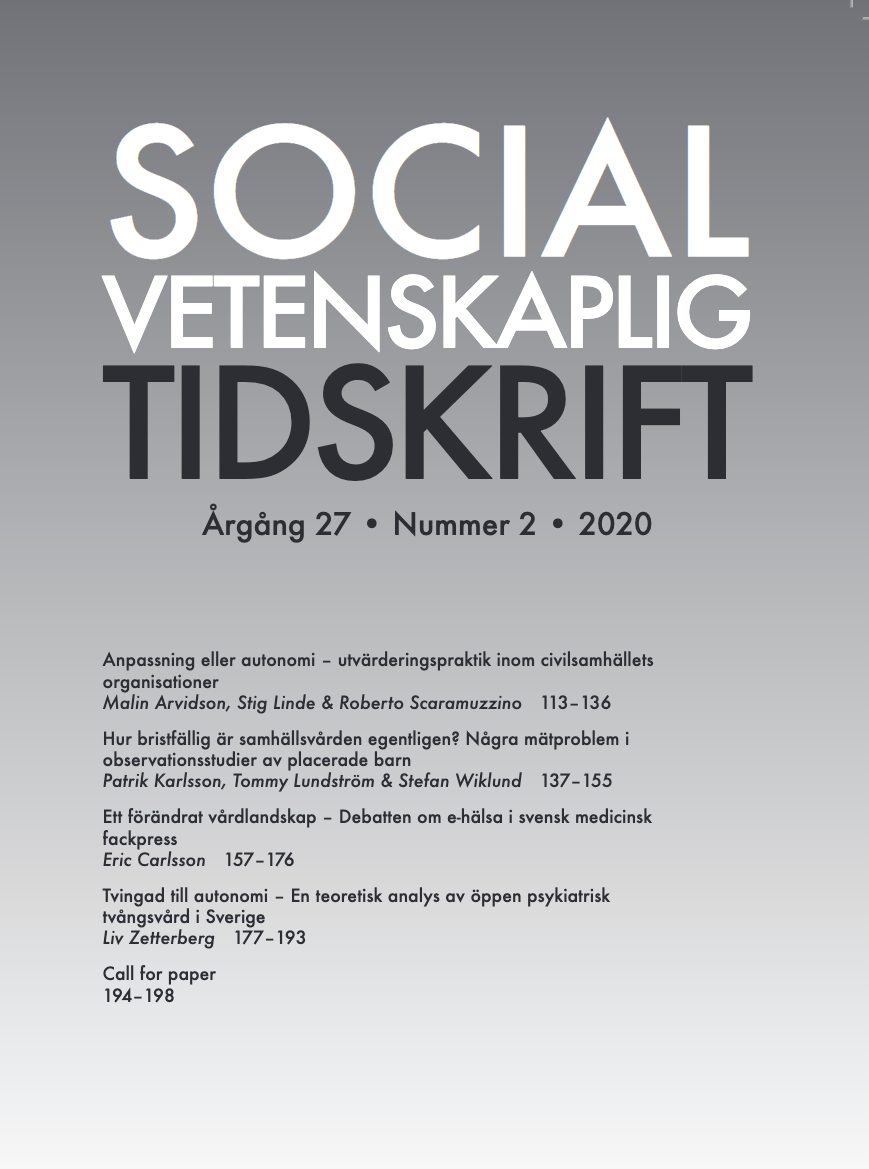Tvingad till autonomi
En teoretisk analys av öppen psykiatrisk tvångsvård i Sverige
DOI:
https://doi.org/10.3384/SVT.2020.27.2.3521Abstract
Utifrån tidigare forskning om öppen psykiatrisk tvångsvård har två paradoxer i förhållande till lagstiftningen identifierats: Öppen psykiatrisk tvångsvård (ÖPT) innebär både mer och mindre autonomi för patienten. ÖPT innebär att autonoma individer tvångsvårdas till autonomi. Syftet med artikeln är att tydliggöra vilka normativa ställningstaganden som ligger till grund för tvångsvårdsformen genom att de två paradoxerna belyses utifrån fyra perspektiv på autonomi. Den första paradoxen förklaras genom att lagstiftaren förhåller sig till både en liberal och en medicinsk-etisk autonomidefinition. I ett liberalt perspektiv är öppen tvångsvård en inskränkning av individens rätt till frihet. I ett medicinsk-etiskt perspektiv kan öppen tvångsvård öka autonomi genom att den ökar eller skyddar patientens autonomi i framtiden. I ett medicinsk-etiskt perspektiv kan andra värden, som hälsa och livskvalitet, också motivera inskränkningar i patientens autonomi. Den andra paradoxen kan förklaras genom att lagstiftaren blandar proceduriella och substantiella rekvisit för autonomi. Patienten förutsätts vara autonom enligt proceduriella rekvisit eftersom patienten inte anses vara beslutsoförmögen. Samtidigt är utfallet av patientens val avgörande för om det respekteras. Om patienten vill avstå vård förutsätts det inte vara patientens autentiska önskan, vilket är ett uttryck för en substantiell syn på autonomi. Vården ska i stället återge patienten dess substantiella autonomi. Vid ÖPT förutsätts patienten i praktiken frivilligt medverka till vården. Det betyder att patienten uppfyller även autenticitetsrekvisiten. Men eftersom syftet med tvångsvården är att återupprätta just den autentiska viljan genom att patienten blir i stånd att frivilligt ta emot tvångsvård är autonomikraven för öppen tvångsvård uppfyllda samtidigt som autonomikraven för vårdens upphörande också är uppfyllda. Om ÖPT ska kunna motiveras utifrån ett medicinsk-etiskt perspektiv krävs att tvångsvården faktiskt ger mer autonomi senare eller andra vinster. I dagsläget finns inget vetenskapligt stöd för att tvångsvårdsformen fungerar. Mot denna bakgrund är det svårt att se vilket värde som tillförs som väger tyngre än patientens autonomi.
Downloads
Publicerad
Referera så här
Nummer
Sektion
Licens
Allt material i Socialvetenskaplig tidskrift publiceras sedan 2022 (Vol 28 Nr 2) med omedelbar öppen tillgång (open access), under Creative Commons-licensen CC BY 4.0. Upphovsrätten till innehållet tillhör respektive författare.
Allt innehåll i tidskriften är fritt tillgängligt utan kostnad och får fritt läsas, laddas ned, kopieras, delas, skrivas ut och länkas. När innehållet används måste författare, källa och licens anges. Författaren kan fritt göra sin publicerade text tillgänglig på institutionella och internetbaserade arkiv, exempelvis sitt lärosätes digitala arkiv eller andra tjänster för detta.
Inga publiceringsavgifter tas ut vid publicering i Socialvetenskaplig tidskrift.


